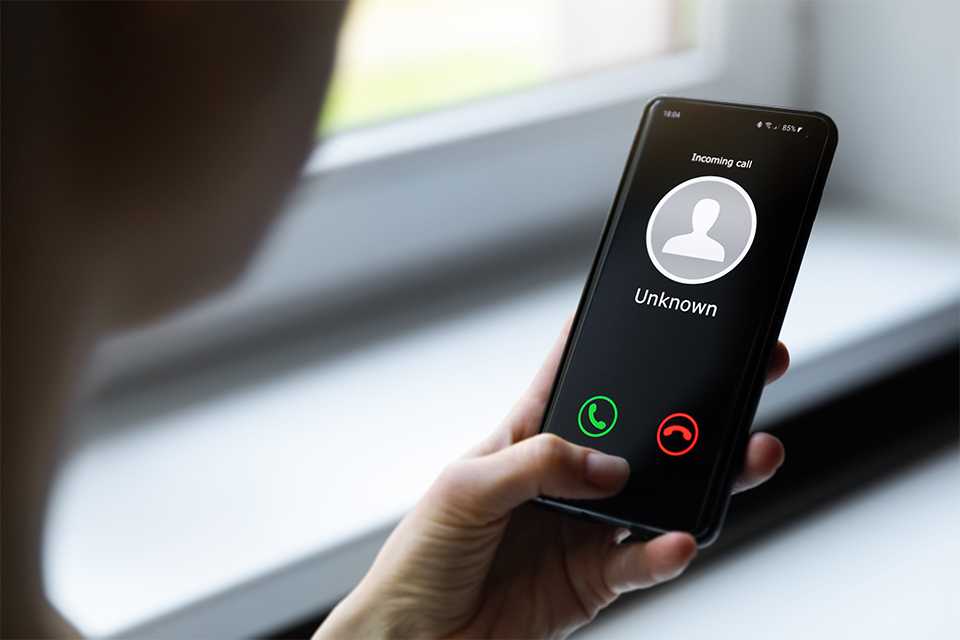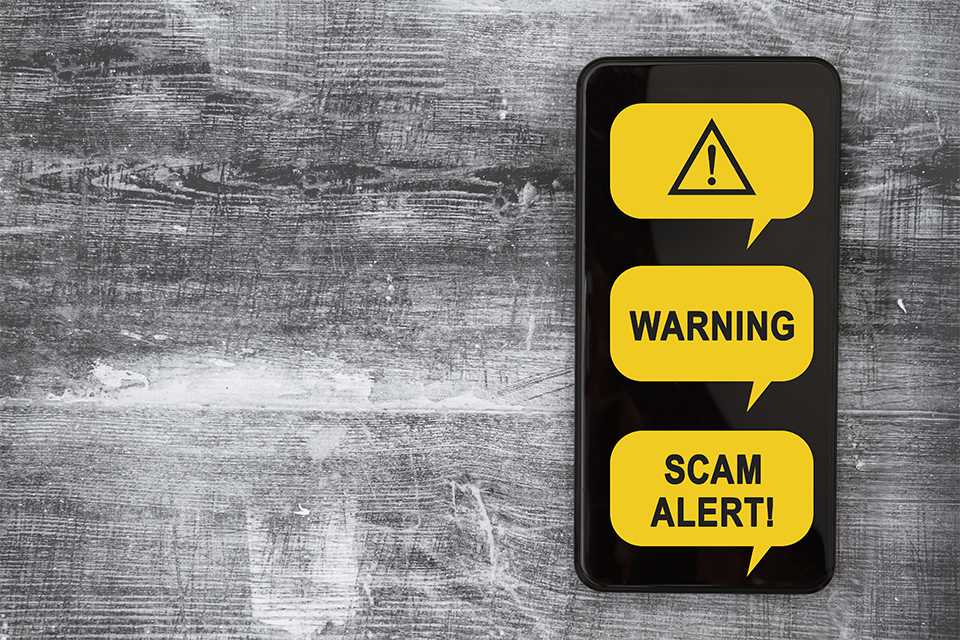How to avoid scams
Learn about the different types of scams and the warning signs to look out for.
Learn about the different types of scams and the warning signs to look out for.
&poi={$this.metadata.pointOfInterest.x},{$this.metadata.pointOfInterest.y},{$this.metadata.pointOfInterest.w},{$this.metadata.pointOfInterest.h}&scaleFit={($this.metadata.pointOfInterest.x>0)?$sfpoi:$sfcenter}&sm=aspect&aspect=3:2&sfcenter=center&sfpoi=poi&qlt=50&fmt=auto&noiser=0&fmt.jpeg.interlaced=true&fmt.jp2.qlt=40&)
Most of us will be targeted by scammers at some point. Their goal is to trick us into giving them our money or revealing personal data they can use to steal from us. Their opportunistic natures have also meant that Coronavirus related fraud has been on the rise, so to avoid getting caught, read our helpful tips below.
If you've never heard of the organisation, and you haven't been in touch with them before, you should be suspicious.
A common scammer's tactic is to ask for some money upfront with greater rewards following later. If this happens, it’s almost certainly a con.
...it probably is. Be sceptical of claims of easy money and big prizes, especially if they ask for you to give money or your bank details.
No organisation should require an answer straight away. If they put you on the spot, refuse. If they’re legitimate, they'll be happy to wait.
Some scammers will contact you telling you that you’ve been hacked and want to confirm your details or tell you to move your money into a second account for safety. Never give any personal details to someone that has contacted you, and always get in contact with the company or bank in question directly.
Ignore any mail, emails or websites with lots of errors. Legitimate organisations know better.
Organisations normally want publicity for special offers or competitions. They'd never ask you to keep secrets from friends and family.
Organisations who’ve obtained your details legitimately will refer to you by your first name or surname, rather than ‘dear sir’ or ‘hello madam’. And they’d never refer to you by an online username or nickname.
Don't give personal details to anyone if you're not sure who they are, especially if they're asking for bank details. Anyone contacting you should have some details already - ask them what they know and how they got that information.
Organisations shouldn't hesitate to offer a phone number or address. They should have a landline, not a mobile number (beginning 07) or premium rate number (beginning 09).

Be wary of PO Box addresses - that won't tell you their location. If someone shows up at your door, ask for ID. Don’t trust a number or address you get on an email or letter, use the details they have on an official website.

Come from someone in your friends list out of the blue. They may have been hacked. If someone you know has shared something with you, check with them that they actually recommended it.
Offer free app downloads.
Look like quizzes but ask you to share personal details.
Look like they send you somewhere official, but direct you to a fake login page.

You receive messages from fake friends and strangers.
The offer looks too good to be true.
The URL has misspelled brand names that send you somewhere completely different.
They want you to share personal details.

Ask you to confirm an order or details of an account.
Tell you you have a tax refund.
Tell you that your password has changed unexpectedly.
Offer get rich quick schemes.
Offer work from home schemes.
Refer to a money transfer or online order you don't recall making.
Send you offers on medicines.
Ask you to transfer money for a reward.

You’ve never heard of the company or person before.
You are put under pressure to act immediately.
They have bad grammar and spelling.
The email doesn’t address you by your real name.
It requests bank details.
The sender email address uses odd letters and numbers.

Tell you your computer software needs updating.
Inform you that you’ve won a prize, and you don't recall entering any competitions.
Advise that you could claim compensation.
Claim you have outstanding debts.
Notify you of tax problems or that you are entitled to a refund.
Try to sell you pensions or investment opportunities.
Tell you that there are problems with a bank or user account.

If it takes a long time for the caller to answer when you pick up.
You’ve never heard of the company before.
They pressure you to act immediately.
They ask for bank details or your pin.
They ask you to install software.
The company/ bank that is calling wouldn’t normally contact you by phone.
Call blocker phones can help you reduce nuisance calls.
Some scammers will encourage you to hang up and call your bank straight away. If they do this, either use a different phone line to contact your bank or wait 10 minutes to ensure the fraudster is no longer on the line.

Tell you that there are problems with a bank or user account.
Include links to open or download something.
Notify you of tax problems or that you are entitled to a refund.
Inform you that you’ve won a prize, and you don't recall entering any competitions.

You recieve a text from a company asking for personal/ bank data.
The text looks suspicious and has bad grammar.
It asks you to click on a link within it.
It pressures you to act immediately.

Inform you that you’ve won a prize/ lottery, and you don't recall entering any competitions.
Tell you about a psychic’s or clairvoyant’s predictions.
Offer work from home schemes.
Are ‘Fallen on hard times’ letters, offering you a loan or similar to help you out.
Try to sell you pensions or investment opportunities.
Claim that you have unclaimed inheritance.

They pressure you to act quickly.
You are asked to send money.
They want you to provide your bank details.
It requests money now for rewards/opportunities later.
They have a premium rate phone number for you to call, beginning 09.

Offer a free pension review.
Pitch you a ‘One-off’ investment opportunity.
Claim you can get high investment returns from overseas.
Suggest you put all your investments into one investment.
Offer you help to access your pension before you hit 55.

You’re contacted out of the blue.
You're pressured into making a deal fast.
They offer to send you brochures/paperwork overnight.
They talk about legal loopholes.
They're not registered with The Financial Conduct Authority.
If you suspect you have received a scam regarding a pension, contact the Pension Advisory Service for advice.

A great way to protect yourself online is to have strong passwords for any account that you have. Have a look at some of the below methods and advice on how to create a strong password.

To help you keep you protected from online attacks it's important that you have antivirus software installed on your devices. Whilst they can't stop every cyber attack, they will help prevent hackers from getting into your mobile or computer.
Not all threats to a computer are designed to steal information or corrupt it, but that doesn't mean that it isn't dangerous. All breaches are designed to take advantage of what is known as a vulnerability, or weakness, in a computers software or operating system.
Here are a few key ways to help prevent spyware from infiltrating your computer or mobile:
Scammers can also steal your details via thrown away documents that have personal information on them. To further protect yourself, ensure anything that shows personal details is scribbled out, ripped up, or even better, shredded using a shredder.

If a scammer is pretending to be a real organisation, contact the real company and let them know about it. Some other authorities you can contact are below.